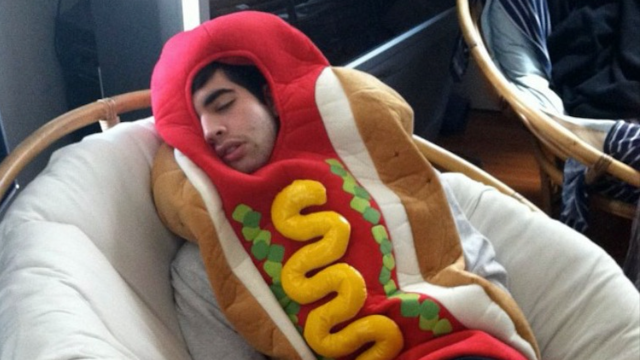A few months ago, I got a package containing four bottles of Never Too Hungover, one of those hangover remedies that you’re supposed to drink the night before and another you’re supposed to take the next day. I pounded beers as if I were rushing a fraternity with the knowledge that I’d be immune from the physical consequences. But I was not safe. I felt as headachey and as vomitey as usual the next day. And I’m happy that I did.
A morning on which the author was very hungoverPhoto: Ryan F. Mandelbaum
This is far from the only cure — there are folk medicines, tech bros engineering solutions, doctors offering water-and-vitamin based solutions, and everything in between.
Some say Hydralyte while others vouch for Gatorade. There’s a lot of money to be made telling people you can cure their hangovers.
Never Too Hungover didn’t work for me-but what if it did? Would I have pounded the beers the next night? And the next? What kinds of decisions would I make and what if I turned binge drinking into a habit? Who knows — I get bad hangovers, and I don’t think we should try to cure them.
After all, hangovers are “another sign or signal that you’re putting something in it that’s essentially poisonous at some level,” Anne Fernandez, clinical psychologist who studies substance abuse at the University of Michigan told Gizmodo. “To be aware or listen to that message seems important.”
We all know that alcohol is poisonous in large amounts. Drink too much, and it will kill you. Drink almost too much, and it can cause blackouts and bad decisions. Drink a lot for a long time and it can lead to brain damage, cancer, liver disease,and other issues. It’s also addictive, perhaps one of the most addictive drugs there is, says Eric Bowman Lecturer in Psychology and Neuroscience at the University of St Andrews in a post for The Conversation.
And of course, it’s fun as hell. I really love drinking, I love the science behind beer and wine, and I love feeling good during a night out, and there’s lots of evidence demonstrating that drinking a little bit of wine daily could be healthy. So I consider myself lucky that my body has system that lets me enjoy the fun of alcohol sometimes, but reminds me that I shouldn’t binge drink every day.
This is just my opinion, of course, and science suggests that overall, the relationship between hangovers and alcohol abuse is really complex. One team of researchers from the University of Missouri found lots of inconsistencies in a review of the data. For some, hangovers were a deterrent. Others tried to drink through it — there’s really not enough data for science to say something generally about people other than me, yet.
Of course, some people don’t get hangovers and aren’t addicted to alcohol. Others are addicted and once had strong hangovers they have since overcome, or just drink through. In the US, hangovers still cost $US224 ($285) billion a year in reduced workplace productivity, healthcare and other costs, as reported by Scientific American.
But eliminating them won’t get rid of those longer-term health problems of binge drinking, Jürgen Rehm, Professor of Addiction Policy at the University of Toronto, told Gizmodo.
Hangovers remind me that binge drinking is unhealthy, and that I shouldn’t do it too often. Without that first line of defence, who knows what other deterrent I’d get to remind me not to binge drink so often. For others, “doing things we regret or not fulfilling our responsibilities can be hugely deterring,” said Fernandez, like missing work, getting into arguments with our loved ones, or driving drunk.
But Rhem gave me a really good analogy: Think of a hangover as like a crossing signal at an intersection. People still jaywalk and end up fine, and people still binge drink without getting hung over or hurting themselves. But ignore the crossing signal too many times and you’re more likely to get hit by cars if they don’t listen a crossing signal. If you binge drink a lot and don’t listen to your hangover, you’re more likely to mess yourself up.
So I’m here to say, let’s stop trying to cure hangovers and instead learn from them, and use them as a reminder that we shouldn’t binge drink all of the time.
